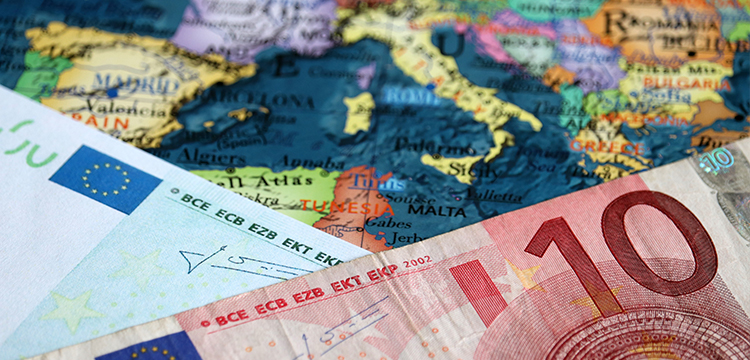Investors piling out of Eurozone shares have parked their cash in the bonds of the better-rated Eurozone member state governments, which now yield close to or below 0% regardless of maturity. The bonds are relatively liquid – by Eurozone standards of general low liquidity – and they carry good credit ratings, AA or better in the Standard and Poors system.
In other words investors are sacrificing Yield in favour of Safety and Liquidity – but in this case with two problems.
Firstly, regarding liquidity, the Eurozone bond market is a monopsony: a market with just one buyer, as opposed to a monopoly where there is just one seller. The sole buyer in the Eurozone bond market is the Eurosystem itself, albeit acting with as many different heads as the hydra: it acts through the European Central Bank (the ECB) and the 19 Eurozone national central banks (the NCBs).
The Eurosystem owns or controls €7-9 trn of a total bond stock of €12 trn. It's €7 trn if you really believe that the imbalances in the TARGET2 payment system are the €1 trn that the ECB reports, or it's €9 trn if you believe the imbalances are €3 trn prior to the spurious and legally implausible overnight netting. Of the base of €6 trn, €2.6 is owned in the Qualitative Easing programme and €3.4 trn is controlled as the collateral securing €3.2 trn of Eurosystem loans to banks, without which the banks would be illiquid.
In such a monopsony, liquidity exists solely because of the willingness of the one buyer to take on supply, so that the liquidity dries up if the buyer will not or cannot continue its stance.
Secondly, regarding safety, the quality of all Eurozone member state government bonds is over-stated, as is the quality of the supranational entities whose creditworthiness depends on the same member states: the ECB, the European Investment Bank, the European Investment Fund, the EU itself, and the European Stabilisation Mechanism.
The quality of these various claims is over-stated because the Euro is a currency without a Eurozone sovereign legal person backing it. Swathes of Eurozone financial assets are rated and accounted for as if there was such a legal person.
The consequence is that the Eurozone financial system is far less well-capitalised than it appears, and that market actors in it are taking far greater risk that they appear to realise. By extension, then, the Eurozone financial system contains meaningful systemic risk, and this systemic risk is being transmitted to investors in the global financial markets.
Normally a currency is backed by all the taxpaying entities in the geography that uses it and on a joint-and-several-liability basis.
The Eurozone, though, is not a legal person, has no government or tax-raising powers, and is no more than a defined term referring to a subset of the European Union. The Eurozone contains the ECB and the NCBs but these are misnomers, as none have the relationship with a sovereign legal person that exists in the US, UK, Japan, Switzerland, Singapore and so on.
Neither the ECB nor the NCBs have assets and liabilities that are genuine "central bank money", meaning the risk-free money that has a sovereign legal person backing it.
The Eurozone member states – which continue to term themselves as "sovereigns" – have given up the sovereign powers over their currencies to the European authorities by joining the Euro. They still issue their own debts, and these are wrongly termed "Eurozone government bonds" because there is no Eurozone government: the term should be "Eurozone member state bonds", which have an intrinsically lower credit quality than genuine sovereign government bonds.
From these anomalies trickle out a range of fault lines in the Eurozone financial system, in which swathes of Eurozone financial assets are over-rated. They are accorded too high a value as collateral, and too low a risk-weighting when calculating the capital that should be held against them.
But the corona virus panic has led investors to overlook these fault lines and pile in.
Bob Lyddon is an author for accountingcpd. To see his courses, click here.

You need to sign in or register before you can add a contribution.